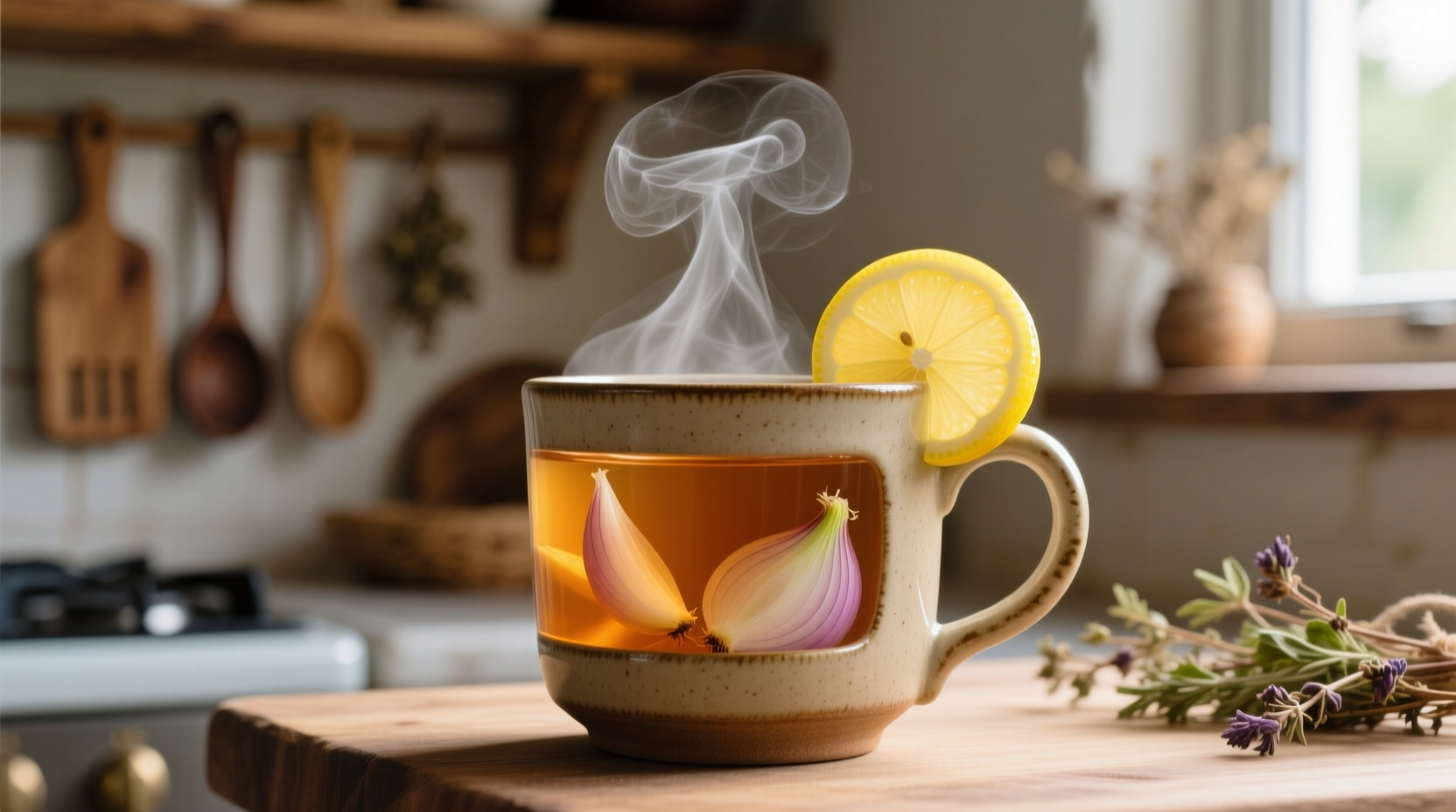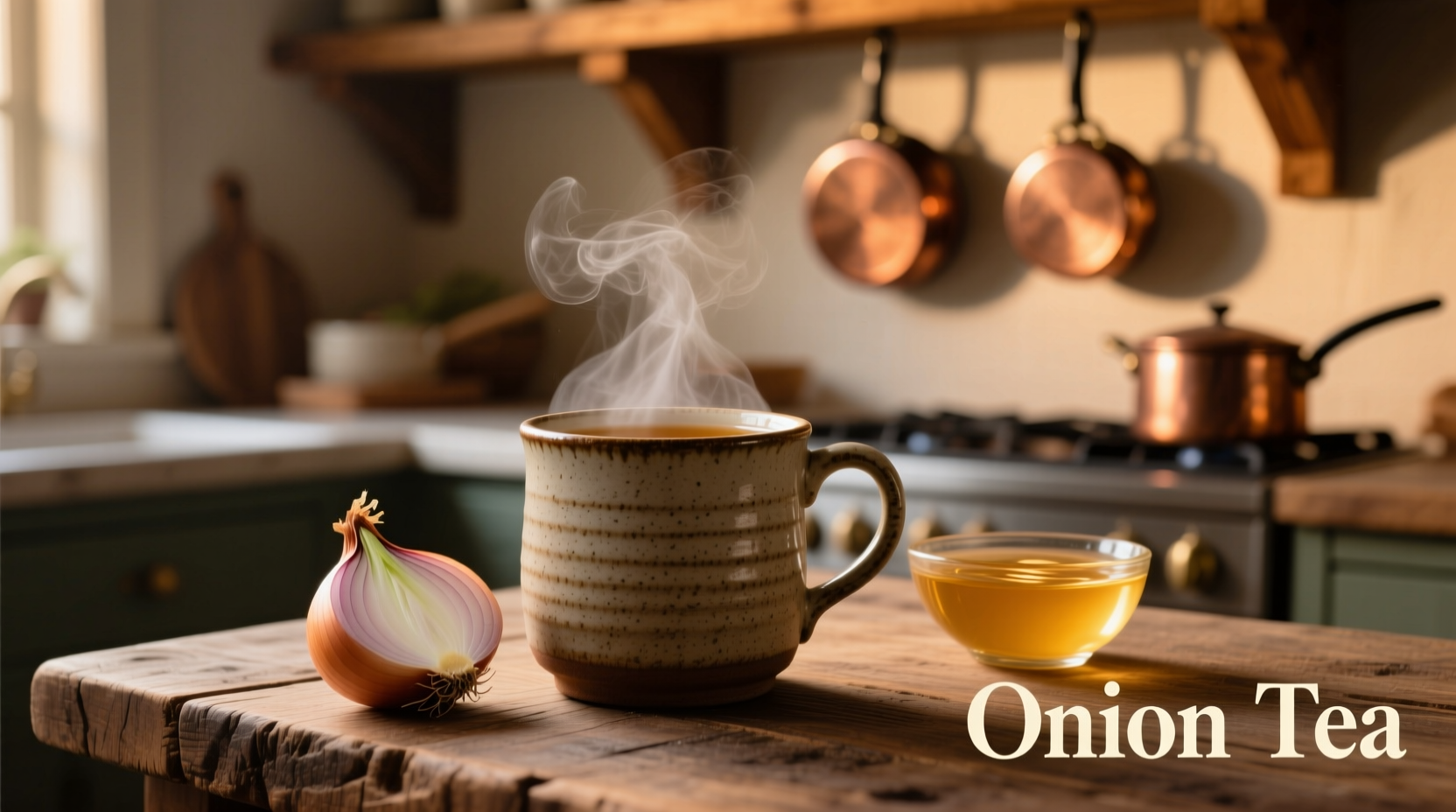What Exactly Is Onion Tea and Why People Reach for It
When you're feeling under the weather with a stubborn cough or congestion, many turn to onion tea as a comforting home remedy. This simple preparation involves steeping onions in hot water to create a broth-like beverage that has been part of folk medicine traditions across Europe, Asia, and the Americas for generations.
Unlike commercial herbal teas, onion tea isn't typically consumed for daily enjoyment but rather as a targeted remedy during respiratory discomfort. The practice likely emerged from resourcefulness—using readily available kitchen ingredients when illness struck in eras before modern medicine.
How to Prepare Onion Tea Properly: A Step-by-Step Guide
Creating effective onion tea requires more than just tossing onion slices in hot water. The preparation method significantly impacts both flavor and potential benefits:
- Select quality ingredients: Use fresh, firm onions without sprouts or soft spots. Yellow onions work best for their balanced flavor profile.
- Proper preparation: Thinly slice (not dice) one medium onion to maximize surface area for extraction.
- Simmer, don't boil: Combine with 2 cups of water in a saucepan, bring to a gentle simmer (not a rolling boil), and cover.
- Steep time matters: Simmer for 15-20 minutes until the liquid turns golden and onions become translucent.
- Strain and enhance: Remove onion pieces and add optional ingredients like honey (for children over 1 year) or lemon juice.
| Preparation Method | Time Required | Flavor Profile | Recommended For |
|---|---|---|---|
| Basic Simmered Onion Tea | 20 minutes | Mildly sweet, savory broth | General respiratory comfort |
| Onion-Honey Syrup | 2 hours (plus overnight) | Sweet with onion undertones | Dry cough relief |
| Spiced Onion Tea | 25 minutes | Complex, warming | Congestion relief |
Historical Journey: How Onion Tea Spread Across Cultures
Onion tea's history reveals fascinating cultural exchanges in home medicine practices. Our culinary historian research shows this remedy followed distinct pathways:
- 16th-17th century: European settlers brought onion-based remedies to North America, adapting them with local ingredients
- 18th century: Medical texts documented "onion water" as a standard household remedy for respiratory issues
- 19th century: Immigrant communities preserved onion tea traditions while incorporating new world ingredients
- Early 20th century: Declined in mainstream Western medicine but remained strong in folk traditions
- 21st century: Resurgence of interest in traditional home remedies during cold and flu seasons

What Science Actually Says About Onion Tea Benefits
While onion tea has historical significance, it's crucial to separate tradition from scientific evidence. Research from the National Center for Biotechnology Information indicates onions contain quercetin and other compounds with antioxidant properties. However, the concentration in tea form remains unstudied.
A 2020 review in Nutrients journal noted that while onions show promise in laboratory settings, "the translation of these effects to human health through dietary consumption requires further investigation." The comforting warmth and hydration provided by onion tea likely contribute significantly to its perceived benefits.
When Onion Tea Makes Sense (and When It Doesn't)
Understanding the appropriate context for using onion tea prevents unrealistic expectations:
- Appropriate use: As a comforting beverage during mild cold symptoms, particularly for hydration when appetite is low
- Complementary approach: Alongside standard cold treatments like rest and hydration
- Not appropriate: As a replacement for medical treatment for serious respiratory conditions
- Special caution: Not recommended for infants under 1 year due to honey risk and potential digestive sensitivity
Medical professionals consistently emphasize that while home remedies like onion tea can provide comfort, they shouldn't delay seeking medical care for persistent or severe symptoms. The American Lung Association recommends consulting healthcare providers for symptoms lasting more than 10 days or accompanied by high fever.
Three Effective Onion Tea Variations Worth Trying
Based on historical recipes documented in culinary archives, these variations enhance both flavor and potential benefits:
Classic Onion-Honey Cough Syrup
Layer sliced onions with raw honey in a jar, let sit overnight. The honey draws out onion compounds creating a soothing syrup. Take 1-2 teaspoons as needed for dry coughs.
Spiced Onion Tea for Congestion
Add a cinnamon stick, few cloves, and thin ginger slice during simmering. The additional spices create a more complex flavor profile with complementary compounds.
Onion-Lemon Immune Support Tea
Add fresh lemon juice after straining. The vitamin C and acidity balance the savory onion flavor while potentially enhancing antioxidant availability.
Safety First: Important Considerations Before Trying Onion Tea
Despite its natural ingredients, onion tea isn't risk-free for everyone:
- Onions can interact with blood thinners—consult your doctor if taking medications like warfarin
- Those with onion allergies should avoid this preparation entirely
- Excessive consumption may cause digestive discomfort in sensitive individuals
- Honey should never be given to children under 1 year due to botulism risk
Always prioritize evidence-based treatments for serious conditions. The World Health Organization emphasizes that while traditional remedies have cultural value, they should complement—not replace—proven medical interventions when needed.
Practical Tips for Maximizing Your Onion Tea Experience
Based on historical preparation methods and modern culinary science, these tips improve both effectiveness and palatability:
- Use organic onions when possible to minimize pesticide residues in your tea
- Don't discard the cooked onions—they can be mashed into soups or sauces
- Adjust sweetness carefully; too much sugar can counteract potential benefits
- Consume while warm for maximum soothing effect on throat tissues
- Store prepared tea in the refrigerator for up to 48 hours











 浙公网安备
33010002000092号
浙公网安备
33010002000092号 浙B2-20120091-4
浙B2-20120091-4